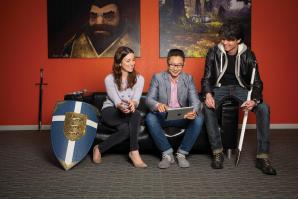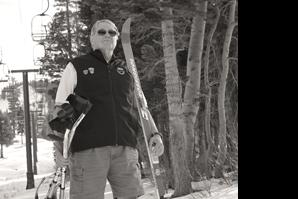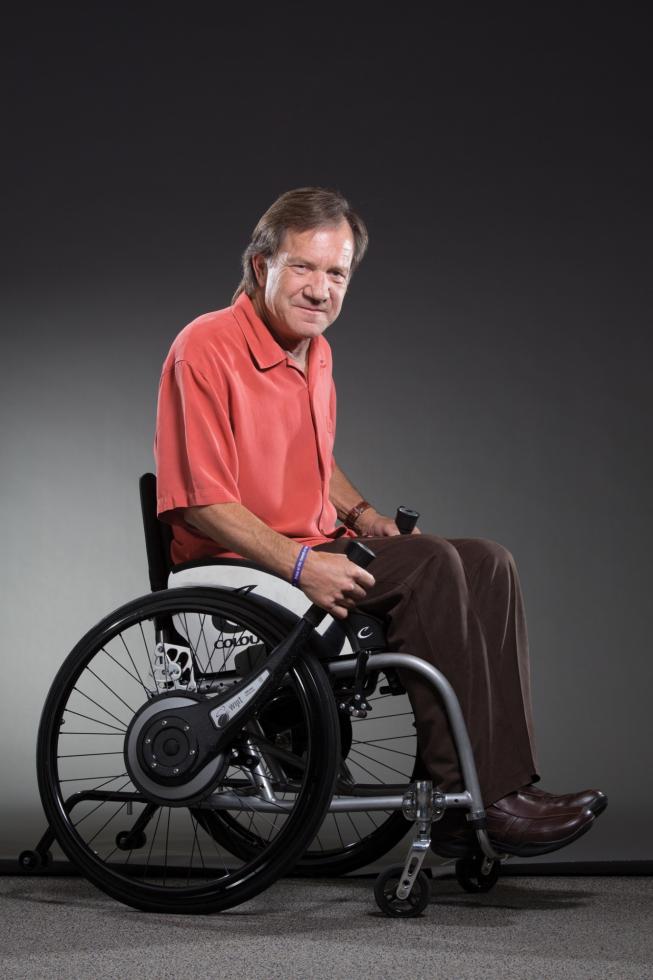Most businessmen have a dream of the business they want to build before they begin. Brian Watwood’s vision for his new company was born in a personal nightmare.
In the mid-1980s, Watwood was an elite athlete. Long-distance biking, tennis and working with search and rescue teams in the mountains were only warm-ups. “I was a professional athlete and one of the top 10 wild-river kayakers in the country,” he recalls. He might have been a national champion.
But Watwood’s life and athletic career were smashed to bits during a fateful bike ride. As he rode the 25 miles home from a horse show, he was hit head-on by a car. The damage to his face and neck were bad, but they weren’t the worst of it. “When I woke up in the hospital three days later, I was paralyzed from the ears down,” he says.
His spinal cord had been badly damaged, but not completely broken. Doctors diagnosed him as an “incomplete quadriplegic,” holding out hope that he might eventually regain some limited use of his arms or legs. Three weeks later, a finger twitched, offering the first sign of reborn life.
Perhaps because of the physical shape he had been in before the accident, Watwood began to heal faster than most people. After months of painful rehabilitation, he was able to sit in a wheelchair. But even that had its limitations. His hands were too damaged to grip the wheels. He could sit in the chair, but he couldn’t move it.
The vision of Watwood’s company came to him during a moment of white-hot aggravation at the Santa Clara Valley Medical Center. He wanted a drink from a fountain that was less than six feet away. The water might as well have been an oasis over miles of desert sand. “I was going to scream in frustration,” he said. “I closed my eyes to keep from screaming, and everything went white in my mind.” In that moment, he recalls, “I had a vision of levers, and I believe it was my epiphany.”
That inspiration has turned into Wijit Inc., a Roseville-based company that manufactures a unique system of levers to propel, steer and brake a wheelchair far easier than conventional methods, offering independence and physical conditioning for people who use them.
The Wijit is based on a simple concept, although its engineering has become more sophisticated to keep up with improvements in wheelchair design. Manufactured by Pride Industries in Roseville, the Wijit includes levers, a roller clutch and wheels that can be mounted to almost any wheelchair. It allows a person to sit upright, keep their arms in a more natural position and move the chair as if they were rowing a boat.
Gearing in the clutch magnifies the force of pushing the lever, “so someone can go farther, longer and easier” than they can by pushing on the wheels, Watwood explains.
Watwood, who admits only to having some mechanical aptitude, created the original design in his home with the help of friends who were engineers. “We designed everything around my disabilities, like my bad hands and weak arms,” Watwood says. He became the test dummy for every design change the group could think of. “If I couldn’t do it, we wouldn’t use it.”
The original lever system mounted on the frame of the chair and gripped the wheels to move them forward. While still focusing on his own recovery, Watwood ran his original company, named “Superquad” (the nickname he had earned from his remarkable recovery), as a one-man shop. “I schlepped along as a sole proprietor for quite a while,” he says.
By the late 1990s, wheel chair designs had changed. Light, metal frames and pneumatic tires made Watwood’s device unuseable. He was back to square one. “I had to modernize the Wijit to fit modern wheelchairs, and in 2000 I came up with the idea for a wheel-based system.”
It took another six years to refine the Wijit to get Medicare approval, a critical step in Watwood’s business plan. The Wijit is classified as a personal propulsion vehicle, making it marketable among hospitals and medical groups and eligible for most insurance reimbursement. It also is registered with the Food and Drug Administration as a durable medical device, in recognition of its potential health benefits, such as reducing obesity or the risk of diabetes, as well as preventing injuries common to wheelchair users.
The National Institute on Disability and Rehabilitation Research estimates that up to 60 percent of wheelchair users experience injuries to their arms and shoulders, including rotator cuff tears, from the strain of pushing their chairs. Studies published in the Journal of Spinal Cord Medicine have documented muscle and hand damage from repetitive straining.
Most people don’t think of how many steps they take in a day. Translated for the average wheelchair user, it is 3,000 to 5,000 “pushes” a day. “That’s millions of times a year,” Watwood says. “If you can get carpal tunnel by typing, think of what you can do pushing your body.”
Watwood and his executive team are working closely with occupational therapists from UC Davis on clinical studies to measure the benefits from the exercise provided by the Wijit, which should give the company even more ammunition for sales.
For his inventiveness in designing the product, Watwood has been inducted into the National Hall of Fame for Persons with Disabilities. He is in elite company, joining such persons as physicist Stephen Hawking and Helen Keller, the nation’s first person to earn a Bachelor of Arts degree while also being blind and deaf.
In 2010, Watwood was awarded the Claire Pomeroy Award by the Sacramento Regional Technology Alliance (SARTA) for the Wijit’s global impact on medicine, chosen over seven other nominees that included an innovative heart stint, a new computer-based approach for breast cancer scans and a device to measure coronary pressure. “It was very humbling to have won it because the other nominees are so much more credentialed than I am,” he says. But Watwood’s reward was not personal recognition. Rather, it was the value of drawing attention to the Wijit and its potential to benefit other people. “The most important thing we can do with our lives is make the lives of other people more fulfilling,” he said.
The estimated number of wheelchair users in the U.S. varies widely, from 1.6 million by UC San Francisco’s Disability Statistics Center to 3.3 million by the Agency for Health Care Research and Quality. Watwood believes that, no matter the number, 99 percent of his potential business is in the U.S. But despite his altruistic intentions or the humanitarian nature of his product, he is quick to point out that, “Just because you have a good idea, it doesn’t mean you can get it to market.”
In an effort to do that, Watwood assembled a small executive team to raise capital and increase marketing. They included fellow UC Santa Cruz alumni Christine Taylor, a former partner at Ernst and Young, as CFO; and Bob Whitson, formerly of computer chip maker Sierra Logic, who came out of semi-retirement to be CEO.
Despite the pedigree of the C-suite, Watwood and his executive team soon learned there were many hurdles between a great idea and reaching potential customers. One of the biggest is that the Wijit needs approvals outside the company for most sales. “The government controls its availability,” Watwood explains, since most sales require Medi-Cal or Medicaid approval to subsidize the Wijit’s nearly $5,000 price tag. That can be a tough sell at a time when the country is trying to cut the cost of health care. “Medi-Cal and Medicaid are challenging everything that is presented to them,” Whitson says.
To overcome that opposition, the company is working to “get the price point down to something the public will pay, so we can lower the cost and still add more functions,” says Whitson about a strategy that can only work if sales volume increases.
Initially, Watwood was the company’s sole champion, using trade shows and calls on hospital administrators and occupational therapists for sales. “Not having much money, that’s how I had to do it,” Watwood says. “It was a matter of people seeing the Wijit and realizing it was an alternative.”
Today, the company relies on a sales network of about 15 representatives and nearly 100 distributorships nationwide to increase awareness of the Wijit. Still, sales are a small fraction of the estimated market. Pride Industries manufactured about 250 sets in the first round, according to Audrey Farrington, Pride’s vice-president of marketing and communication. “It’s not the smallest job we have or the biggest one either,” she says of the Roseville assembly plant, which is state-certified to manufacture medical devices and which also tests and distributes the Wijit.
“People come to us because we’re a good contract manufacturer,” she adds. “But it’s also good that this is creating jobs for people with disabilities to make a product that helps people with disabilities.” Although production has only ramped up in the past year, Farrington recalls Pride Industries has been talking to Watwood for years as he perfected the Wijit design. “He’s had a vision to help individuals by giving them freedom,” says Farrington. “He is driven by that passion and it’s his life’s work.”
But passion, by itself, does not always fuel success. “We could go faster if we had more capital,” said Whitson, as recently as late May. But even though he was gaining traction with potential investors, by June the company was forced to face the ultimate catch-22. “It’s difficult to grow a company without money,” Whitson acknowledged. “We’ve been trying to do this with revenue from sales and without investors and that is a slow way to grow.”
Company executives made the tough decision to put the company on
the market in hopes others could expand Wijit’s market. “I
know this is personally tough on Brian,” Whitson conceded. “But
we needed to grow in a bigger way. We’ve had people and companies
interested in this technology, and they have bigger pockets than
we do.”
Still, Watwood contends there are three types of companies in the
business world. Some, like fashion or commodities, appeal to the
buyer’s ego. Technology products, which can make people more
efficient or save them money. The Wijit, he believes, falls into
a third category that provides a service to meet a basic human
need. In pitches to investors, “we led with the why of what we
do,” Watwood says. “To service a human need, to be out there in
the world.”
Now, those pitches will shift to potential buyers of the company, but the heartfelt passion for the product remains unchanged. “Instead of selling Wijits, we’re selling the concept,” Watwood says.
“I’m the entrepreneur in this,” he adds, “but I have a group of
professionals to run the company, and I trust their judgment that
this is the right thing to do. We ought to take advantage of the
opportunity and the interest in the technology. Things go fast
once you change direction.”
With a few million dollars, Watwood believes Wijit Inc. could be
successful worldwide and assumes a new owner would continue the
company’s partnership with Pride Industries. “We could take
this international,” says Watwood, who expects approval soon of
his European patents for the Wijit.
Following back surgery last year, Watwood uses a walking stick and keeps a Wijit-equipped chair close by. “I’ve had to learn how to walk three times; at birth, after the accident and after the back surgery,” he says. He believes that same determination is necessary in business. After having one version of the Wijit become obsolete, Watwood was hit by the recession just after his new design received Medicare approval, making investors hard to come by. In the grand scheme of things, the decision to seek a buyer for Wijit Inc. is just another setback to overcome.
“People say I’m successful because I don’t give up,” says Watwood, who is inspired by the founder of Pandora, who allegedly was turned down 324 times before finding investors. “I wasn’t trained in patent or intellectual property law or how to put my hand out and ask for money or how to be disabled in a wheelchair.
“You can’t really train someone to be an entrepreneur. If you don’t have the gumption or mettle in your soul, you will get knocked down,” he says, sounding like a man who has gotten back up more than once and is ready to do it again.
Passion for Sale
Bob Whitson was looking for an angel with a heart.
As CEO of Wijit Inc., a Roseville-based company that manufactures a proprietary wheelchair propulsion system, it was Whitson’s job to find investors to get the fledgling medical-device company off the ground. Since joining the company last fall, Whitson has made dozens of pitches to so-called angel investors and traditional venture capital groups. “It’s been a tough sell,” he says, disappointment obvious in his voice.
The recent decision to put Wijit Inc. on the market shows that passion doesn’t always lead to profit.
It’s not as if Whitson doesn’t know how to raise money. As President of Sierra Logic, Whitson made the computer-chip maker one of the region’s most successful and fastest-growing high-tech companies, garnering an estimated $32 million in three rounds of venture fundraising. The potential investor benefits were easy to lay out on a spreadsheet. “It was obvious we were selling chips for a profit,” he says.
But Whitson soon learned that selling potential investors on Wijit wasn’t easy to explain in financial terms. “This is a different industry, and I actually talked to potential investors differently,” with a pitch that appealed to their hearts more than their portfolio, he says. “One thing we did was lead with our mission of improving people’s lives.”
As he culled through his leads, Whitson looked for a few investors who shared the company’s passion. “But, they are difficult to find,” he says, which led to the decision in early June to put the company on the market.
The company’s mixed sales record scared off some potential investors. Like many startups, Wijit was run on a shoestring and by one man, with Watwood scouring trade shows and calling on hospital administrators for sales. “The company has been chronically underfunded, so we don’t have the sales history to impress investors,” Whitson explains. “And if we had more money in the bank, we would have more sales.”
The other hurdle to attracting investors was more surprising. From a retail standpoint, medical care is a growing industry, especially with federal health care mandating insurance coverage for an increasing number of people. But Whitson is quick to note that many traditional investors see it as a minefield more than a gold mine.
At press time it was announced that Roseville-based Kinova USA acquired Wijit Inc. in a leveraged buyout. Kinova will be incorporating Wijit’s drive technology into its line of assistive devices for those living with disabilities. Dan Niccum, CEO of Kinova USA, says Wijit operations will remain in Roseville, and the product will continue to be manufactured by Pride Industries. He also confirmed that Watwood will continue to work for the company.
“We are absolutely confident that with an aggressive marketing
and international distribution program we can make Wijit
profitable,” Niccum says.
Recommended For You

Mind Games
Tech darling Mark Otero hit it big, then almost hit restart
Bright orange walls and ergonomic chairs. A black conference table flanked by a half-dozen scruffy-chic men (zip-front sweaters, double-pierced ears, turn-of-the-millennium tattoos) and three times as many digital devices (nobody brought just one).

Learning to Live Again
Disabled sports bring fresh perspectives
Doug Pringle lost a leg to the Vietnam War in 1968. He was recovering at the Presidio of San Francisco hospital the day World War II veterans stopped by for a visit.



